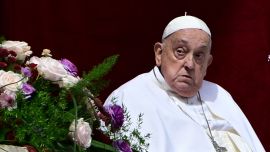A sudden chill threatens the warm relationship between the two largest economies in South America, as Brazil’s far-right president warned of dire consequences in the event of a leftwing populist victory in Argentina’s elections.
Sunday’s surprise primary result in Argentina means that President Mauricio Macri is on course to lose October’s vote to Alberto Fernandez, the leftwinger running on a ticket with former president Cristina Kirchner. Brazil’s President Jair Bolsonaro has made no secret of his desire to see Macri remain in office, while Fernandez has publicly welcomed criticism from a man he described as “racist, violent and misogynistic”.
With the election of Bolsonaro last year, the historically protectionist economies of Brazil and Argentina both have ideologically aligned presidents in office simultaneously. While Macri’s suave, businesslike persona may have clashed stylistically with Bolsonaro’s abrasive ex-army rhetoric, the two men shared similar economic goals, as demonstrated by the recent trade deal between the European Union and Mercosur, the South American customs union. Deteriorating relations between the two most powerful economies in the bloc risks undermining that agreement’s ratification, as well as billions of dollars in bilateral trade.
Brazil and Argentina make up almost two thirds of the US$4 trillion of economic output in South America. Argentina is Brazil’s biggest trade partner in the region, accounting for nearly US$30 billion in commerce each year. Brazil is Argentina’s biggest export buyer globally, according to data from the International Monetary Fund.
‘Brothers Fleeing’
In his first comments after the vote, Bolsonaro claimed that the return of “lefties” to power in Argentina could spark a wave of migration to Brazil, mirroring the situation in northern parts of the country where tens of thousands of Venezuelans have flooded in as their economy implodes.
“We don’t want our Argentine brothers fleeing to Brazil,” Bolsonaro said in Rio Grande do Sul state, which borders Argentina.
At present this seems improbable. Around 4 million Venezuelans have fled the country over the past few years and around 90 percent those remaining live in poverty, according to the United Nations Economic Commission for Latin America and the Caribbean. By comparison, 27 percent of Argentinians live in poverty, according to the Organization of Economic Cooperation and Development.
In June, Bolsonaro had enthusiastically backed Macri during a visit to Buenos Aires. In the wake of that trip, Fernandez headed to Brazil to meet former president Luiz Inacio Lula da Silva in his jail cell in the southern city of Curitiba where he is imprisoned on corruption charges. On Monday night he described the ex-president as a “political prisoner”. Lula and Kirchner are longstanding allies.
Bolsonaro’s comments “show that people are worried about what they remember from when Cristina was president,” said Earl Anthony Wayne, a former U.S. ambassador to Argentina under Presidents George W. Bush and Barack Obama. “Right now there’s a lot of concern.”
During her time in office, Kirchner nationalised pension funds, imposed currency controls and tampered with economic statistics. Meanwhile, Fernandez has stoked investor fears by pledging to change the terms of a US$56 billion dollar agreement between Argentina and the International Monetary Fund.
Fernandez has also criticized the free-trade deal signed in June between the Mercosur trading bloc and the EU. He said it offered “nothing to celebrate, but rather a lot of reasons to worry.”
Damage Control
With so much trade potentially in the crosshairs, Brazil’s Economy Minister Paulo Guedes will likely step in to temper Bolsonaro’s harsh words, according to Oliver Stuenkel, an international relations professor at the Fundacao Getulio Vargas. A champion of free markets, Guedes is the president’s top economic adviser and one of the most influential cabinet members.
“Guedes keeps his eyes on what really matters to him, and this will matter,” Stuenkel said. “Guedes will try to save things in the next couple of weeks, saying ’we’ll have good relationship with whomever gets elected, we’re not worried.’ Then it’s anybody’s guess whether they will succeed in stopping Bolsonaro from saying things.”
’Blown Up’
In a Monday meeting at Brazil’s economy ministry, there was concern over Bolsonaro’s remarks on Argentina. Undersecretaries urged Guedes to speak with Bolsonaro and ask him to distance himself from Macri, according to a person present at the gathering who requested anonymity because it was private.
To date, Fernandez has made little attempt to either allay investor concerns or downplay his disagreements with Bolsonaro.
However, some market analysts believe that he would be more pragmatic in power. Tony Volpon, a former Brazil central bank director who’s now chief economist at UBS Brasil, said that despite current financial market fears, Fernandez will likely follow the precedent of leftist Latin American leaders including Lula and follow an orthodox policy set upon taking power. That means Argentina and Brazil could still do business, he said.
With Argentina mired in recession, it is more dependent than usual on ties with Brazil to ensure trade and foreign investment, according to Mauricio Santoro, an international relations professor at Rio de Janeiro’s state university.
“It’s strategic, so they will put some effort into building this relationship. But, as our friends in Argentina know, it takes two to tango,” Santoro said.
- BLOOMBERG


























Comments